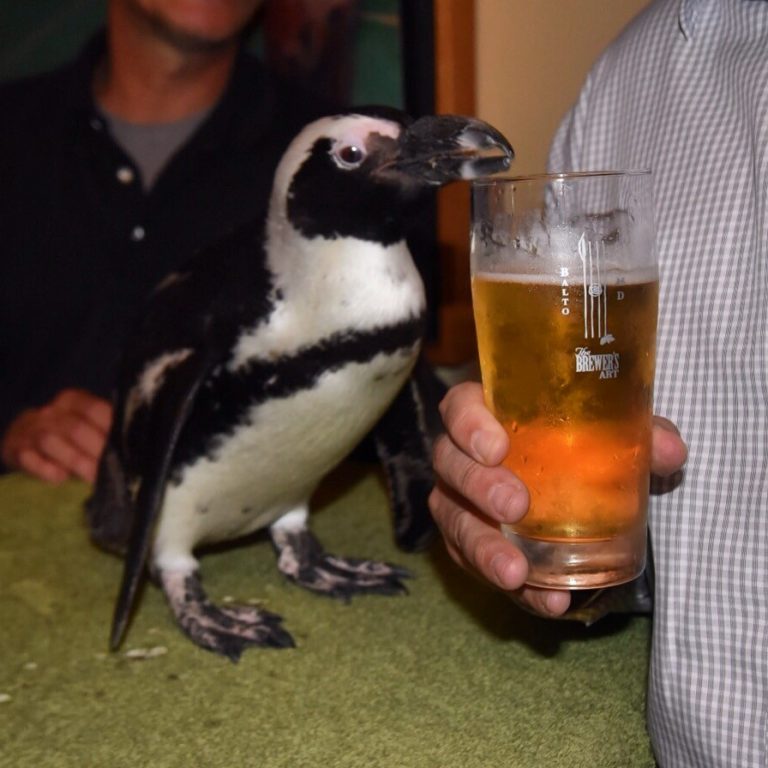Brewer’s Art In Baltimore Produces Penguin Pils
Tom Creegan, co-owner, of The Brewer’s Art, a brewpub in Baltimore, wanted to do something special for the annual Brew at the Zoo at the Maryland Zoo which celebrates its 140th anniversary this year.
The Baltimore zoo was looking to raise money to support efforts to track endangered penguins in South Africa and strengthen education programs about the animals.
That’s the genesis of Penguin Pils, Brewer’s Art’s new pilsner brew that being sold at the Zoo, the brew pub and several Baltimore restaurants and bars. The light 4.5% abv. Lager — inspired by the warm weather climate native to the South African penguins-- goes perfect on hot summer days at the zoo.
The African penguin program at the Maryland Zoo is home to North America’ largest South African penguin exhibit. Penguin Coast houses a colony of 66 penguins. Zoo staff not only care for the penguins but support conservation and research projects and public education efforts about the special species.
Part of all sales of Penguin Pils will go to the zoo’s participation in Saving Animals from Extinction, an effort by 230 zoos and aquariums nationwide to help protect certain endangered species. The money will help purchase satellite tags to track wild penguins in South Africa, send penguin keepers to South Africa to help with the tagging process and support education programs at the zoo. About 90 percent of the South African penguin population has disappeared in the past century. Unlike most penguins that live near ice and snow, the African penguins are acclimated to warmer climates and live along the coast and islands of southern Africa.
Fewer than 6,000 penguins now live on a South African island in the middle of a major shipping lane and have been subject to oil spills for many years, according to the Earth Watch Institute. In 1900, about 1.5 million penguins lived there. In total there are about 52,000 of the birds left in the wild, according to the Maryland Zoo. Human interference has posed the greatest threat as collection of their eggs for human consumption and collection of guano used for fertilizer destroyed nesting sites which contributed to the penguins near extinction. African penguins continue to compete with commercial fisherman for access to fish and remain vulnerable to pollution along the coastline caused by oil spills.
Penguin Pils was released in May in conjunction with Brew at the Zoo held May 28-29, one of the zoo’s major fundraising events that feature beers from over 30 breweries. In addition to The Brewers Art, other Baltimore area breweries included RavenBeer and Monument City Brewing in Baltimore and Jailbreak Brewing in Laurel, Md.
At the zoo’s Penguin Coast exhibit, visitors can get up close to penguins in an intimate 30-minute private tour. The tour costs $45 for non members and $35 for members and is offered twice daily.
Penguin Pils is the first pilsner ever made by The Brewer’s Art which celebrates its 20th anniversary this year. Pilsners take about a month to complete fermentation process, a couple weeks longer than most other styles of beer. That extra time partly explains why the brewpub has never done one before, Creegan said. The brewpub had some extra lager yeast left after doing a collaboration brew with a brewery in Washington D.C., so Creegan thought it would be perfect time to try a pilsner to help the penguins. “We were happy to do something special for their anniversary and ours,” Creegan said.
Zoo officials are ecstatic at collaborating on their first brew.
“Many of us are fans of The Brewers Art to begin with and when the idea for Penguin Pils was floated, there was no hesitation at all,” said Jane Ballentine, a zoo spokeswoman.
In fact, the zoo brought along Lilly the penguin, its penguin ambassador, to the tapping party at The Brewer’s Art in early May. How cool is that?

